Regulation of Oil and Gas Industry: Historical Economy Analysis Report
VerifiedAdded on 2020/12/09
|9
|2343
|443
Report
AI Summary
This report provides a comprehensive analysis of the historical economy of the oil and gas industry, examining the evolution of the industry from its early stages to the present day. It delves into the significant role of OPEC, the impact of political instability, and the fluctuations in oil prices. The report highlights the increasing need for government regulation, particularly in the US and UK, to address issues such as energy conservation, national security, and the depletion of natural resources. The report also discusses the different methods of regulation, including government control over private firms, long-term planning, and the development of strict rules and tax regulations. Furthermore, it explores the impact of factors such as terrorism, natural calamities, and the invention of new energy sources like Shell gas, and how these factors have shaped government policies. The conclusion emphasizes the importance of government intervention to ensure the safety and sustainability of the oil and gas industry, including measures for energy conservation and the promotion of renewable sources.
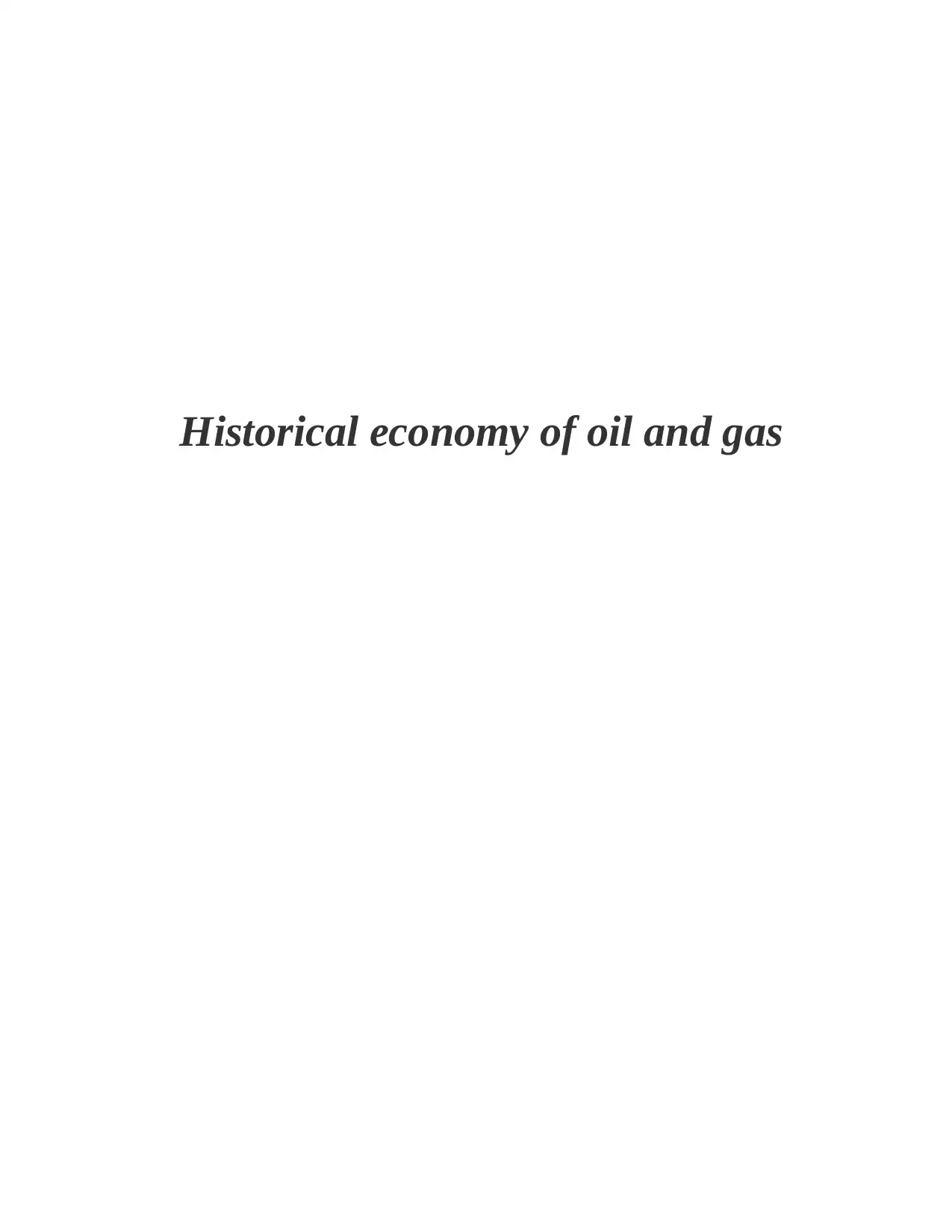
Historical economy of oil and gas
Paraphrase This Document
Need a fresh take? Get an instant paraphrase of this document with our AI Paraphraser

Table of Contents
INTRODUCTION...........................................................................................................................1
MAIN BODY..................................................................................................................................1
CONCLUSION................................................................................................................................4
REFERENCES................................................................................................................................6
INTRODUCTION...........................................................................................................................1
MAIN BODY..................................................................................................................................1
CONCLUSION................................................................................................................................4
REFERENCES................................................................................................................................6
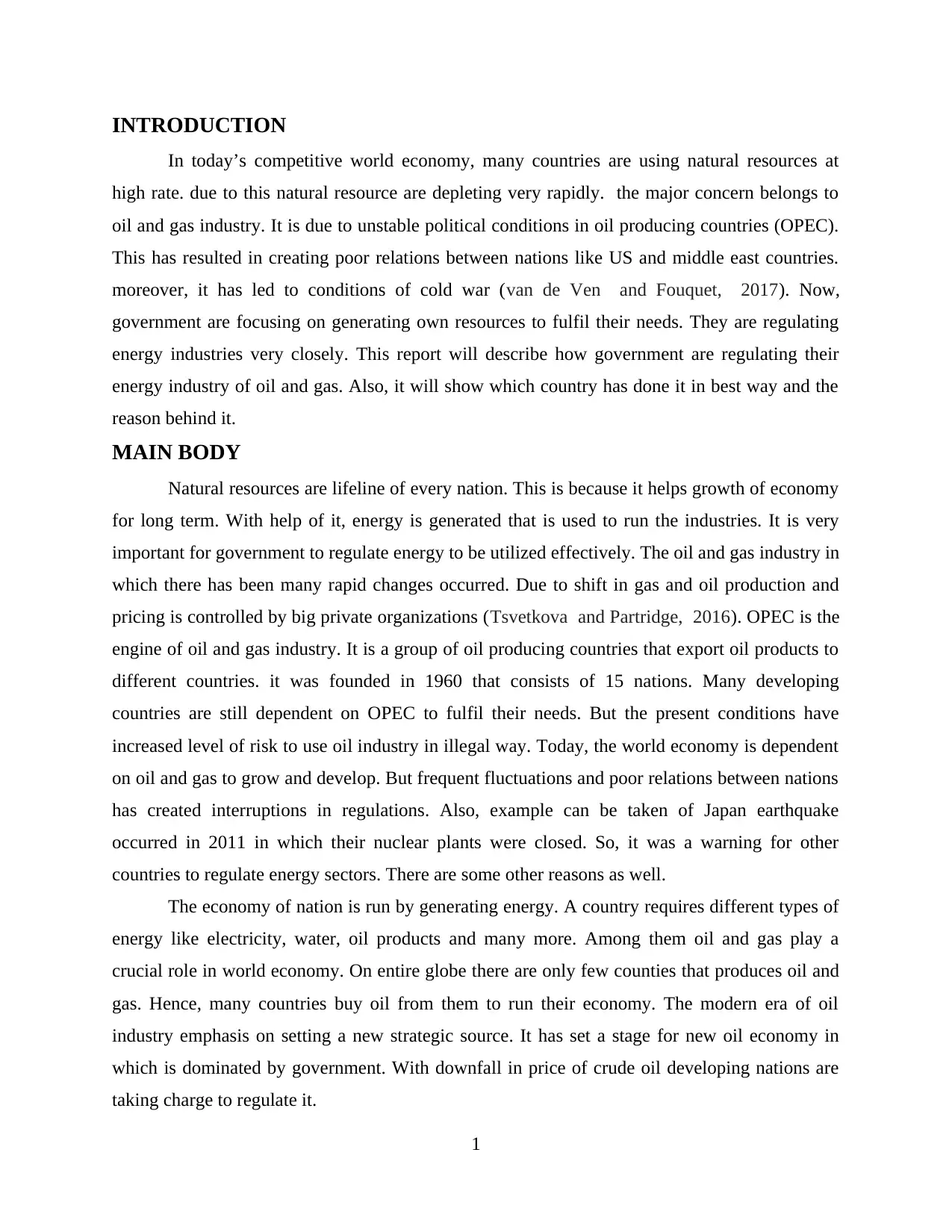
INTRODUCTION
In today’s competitive world economy, many countries are using natural resources at
high rate. due to this natural resource are depleting very rapidly. the major concern belongs to
oil and gas industry. It is due to unstable political conditions in oil producing countries (OPEC).
This has resulted in creating poor relations between nations like US and middle east countries.
moreover, it has led to conditions of cold war (van de Ven and Fouquet, 2017). Now,
government are focusing on generating own resources to fulfil their needs. They are regulating
energy industries very closely. This report will describe how government are regulating their
energy industry of oil and gas. Also, it will show which country has done it in best way and the
reason behind it.
MAIN BODY
Natural resources are lifeline of every nation. This is because it helps growth of economy
for long term. With help of it, energy is generated that is used to run the industries. It is very
important for government to regulate energy to be utilized effectively. The oil and gas industry in
which there has been many rapid changes occurred. Due to shift in gas and oil production and
pricing is controlled by big private organizations (Tsvetkova and Partridge, 2016). OPEC is the
engine of oil and gas industry. It is a group of oil producing countries that export oil products to
different countries. it was founded in 1960 that consists of 15 nations. Many developing
countries are still dependent on OPEC to fulfil their needs. But the present conditions have
increased level of risk to use oil industry in illegal way. Today, the world economy is dependent
on oil and gas to grow and develop. But frequent fluctuations and poor relations between nations
has created interruptions in regulations. Also, example can be taken of Japan earthquake
occurred in 2011 in which their nuclear plants were closed. So, it was a warning for other
countries to regulate energy sectors. There are some other reasons as well.
The economy of nation is run by generating energy. A country requires different types of
energy like electricity, water, oil products and many more. Among them oil and gas play a
crucial role in world economy. On entire globe there are only few counties that produces oil and
gas. Hence, many countries buy oil from them to run their economy. The modern era of oil
industry emphasis on setting a new strategic source. It has set a stage for new oil economy in
which is dominated by government. With downfall in price of crude oil developing nations are
taking charge to regulate it.
1
In today’s competitive world economy, many countries are using natural resources at
high rate. due to this natural resource are depleting very rapidly. the major concern belongs to
oil and gas industry. It is due to unstable political conditions in oil producing countries (OPEC).
This has resulted in creating poor relations between nations like US and middle east countries.
moreover, it has led to conditions of cold war (van de Ven and Fouquet, 2017). Now,
government are focusing on generating own resources to fulfil their needs. They are regulating
energy industries very closely. This report will describe how government are regulating their
energy industry of oil and gas. Also, it will show which country has done it in best way and the
reason behind it.
MAIN BODY
Natural resources are lifeline of every nation. This is because it helps growth of economy
for long term. With help of it, energy is generated that is used to run the industries. It is very
important for government to regulate energy to be utilized effectively. The oil and gas industry in
which there has been many rapid changes occurred. Due to shift in gas and oil production and
pricing is controlled by big private organizations (Tsvetkova and Partridge, 2016). OPEC is the
engine of oil and gas industry. It is a group of oil producing countries that export oil products to
different countries. it was founded in 1960 that consists of 15 nations. Many developing
countries are still dependent on OPEC to fulfil their needs. But the present conditions have
increased level of risk to use oil industry in illegal way. Today, the world economy is dependent
on oil and gas to grow and develop. But frequent fluctuations and poor relations between nations
has created interruptions in regulations. Also, example can be taken of Japan earthquake
occurred in 2011 in which their nuclear plants were closed. So, it was a warning for other
countries to regulate energy sectors. There are some other reasons as well.
The economy of nation is run by generating energy. A country requires different types of
energy like electricity, water, oil products and many more. Among them oil and gas play a
crucial role in world economy. On entire globe there are only few counties that produces oil and
gas. Hence, many countries buy oil from them to run their economy. The modern era of oil
industry emphasis on setting a new strategic source. It has set a stage for new oil economy in
which is dominated by government. With downfall in price of crude oil developing nations are
taking charge to regulate it.
1
⊘ This is a preview!⊘
Do you want full access?
Subscribe today to unlock all pages.

Trusted by 1+ million students worldwide
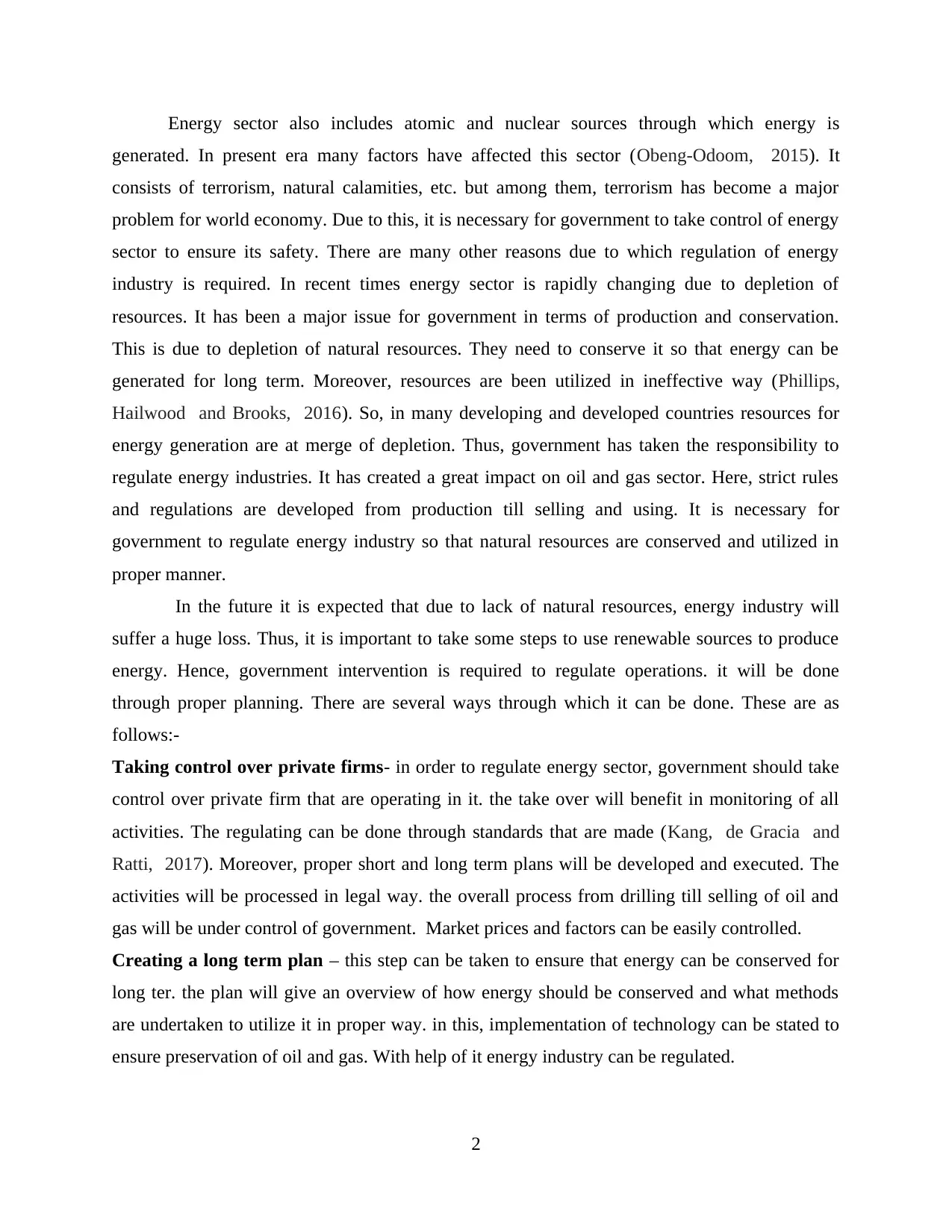
Energy sector also includes atomic and nuclear sources through which energy is
generated. In present era many factors have affected this sector (Obeng-Odoom, 2015). It
consists of terrorism, natural calamities, etc. but among them, terrorism has become a major
problem for world economy. Due to this, it is necessary for government to take control of energy
sector to ensure its safety. There are many other reasons due to which regulation of energy
industry is required. In recent times energy sector is rapidly changing due to depletion of
resources. It has been a major issue for government in terms of production and conservation.
This is due to depletion of natural resources. They need to conserve it so that energy can be
generated for long term. Moreover, resources are been utilized in ineffective way (Phillips,
Hailwood and Brooks, 2016). So, in many developing and developed countries resources for
energy generation are at merge of depletion. Thus, government has taken the responsibility to
regulate energy industries. It has created a great impact on oil and gas sector. Here, strict rules
and regulations are developed from production till selling and using. It is necessary for
government to regulate energy industry so that natural resources are conserved and utilized in
proper manner.
In the future it is expected that due to lack of natural resources, energy industry will
suffer a huge loss. Thus, it is important to take some steps to use renewable sources to produce
energy. Hence, government intervention is required to regulate operations. it will be done
through proper planning. There are several ways through which it can be done. These are as
follows:-
Taking control over private firms- in order to regulate energy sector, government should take
control over private firm that are operating in it. the take over will benefit in monitoring of all
activities. The regulating can be done through standards that are made (Kang, de Gracia and
Ratti, 2017). Moreover, proper short and long term plans will be developed and executed. The
activities will be processed in legal way. the overall process from drilling till selling of oil and
gas will be under control of government. Market prices and factors can be easily controlled.
Creating a long term plan – this step can be taken to ensure that energy can be conserved for
long ter. the plan will give an overview of how energy should be conserved and what methods
are undertaken to utilize it in proper way. in this, implementation of technology can be stated to
ensure preservation of oil and gas. With help of it energy industry can be regulated.
2
generated. In present era many factors have affected this sector (Obeng-Odoom, 2015). It
consists of terrorism, natural calamities, etc. but among them, terrorism has become a major
problem for world economy. Due to this, it is necessary for government to take control of energy
sector to ensure its safety. There are many other reasons due to which regulation of energy
industry is required. In recent times energy sector is rapidly changing due to depletion of
resources. It has been a major issue for government in terms of production and conservation.
This is due to depletion of natural resources. They need to conserve it so that energy can be
generated for long term. Moreover, resources are been utilized in ineffective way (Phillips,
Hailwood and Brooks, 2016). So, in many developing and developed countries resources for
energy generation are at merge of depletion. Thus, government has taken the responsibility to
regulate energy industries. It has created a great impact on oil and gas sector. Here, strict rules
and regulations are developed from production till selling and using. It is necessary for
government to regulate energy industry so that natural resources are conserved and utilized in
proper manner.
In the future it is expected that due to lack of natural resources, energy industry will
suffer a huge loss. Thus, it is important to take some steps to use renewable sources to produce
energy. Hence, government intervention is required to regulate operations. it will be done
through proper planning. There are several ways through which it can be done. These are as
follows:-
Taking control over private firms- in order to regulate energy sector, government should take
control over private firm that are operating in it. the take over will benefit in monitoring of all
activities. The regulating can be done through standards that are made (Kang, de Gracia and
Ratti, 2017). Moreover, proper short and long term plans will be developed and executed. The
activities will be processed in legal way. the overall process from drilling till selling of oil and
gas will be under control of government. Market prices and factors can be easily controlled.
Creating a long term plan – this step can be taken to ensure that energy can be conserved for
long ter. the plan will give an overview of how energy should be conserved and what methods
are undertaken to utilize it in proper way. in this, implementation of technology can be stated to
ensure preservation of oil and gas. With help of it energy industry can be regulated.
2
Paraphrase This Document
Need a fresh take? Get an instant paraphrase of this document with our AI Paraphraser
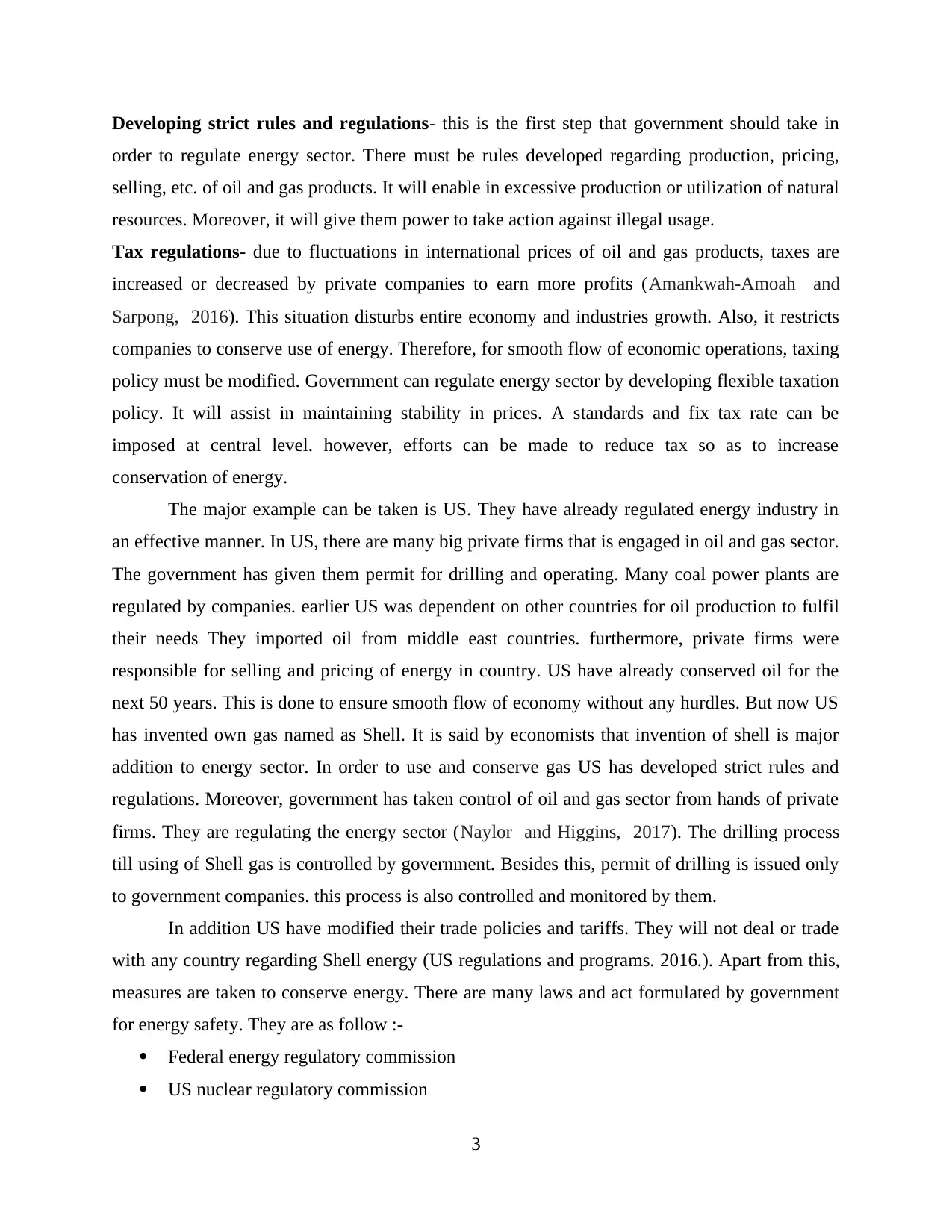
Developing strict rules and regulations- this is the first step that government should take in
order to regulate energy sector. There must be rules developed regarding production, pricing,
selling, etc. of oil and gas products. It will enable in excessive production or utilization of natural
resources. Moreover, it will give them power to take action against illegal usage.
Tax regulations- due to fluctuations in international prices of oil and gas products, taxes are
increased or decreased by private companies to earn more profits (Amankwah-Amoah and
Sarpong, 2016). This situation disturbs entire economy and industries growth. Also, it restricts
companies to conserve use of energy. Therefore, for smooth flow of economic operations, taxing
policy must be modified. Government can regulate energy sector by developing flexible taxation
policy. It will assist in maintaining stability in prices. A standards and fix tax rate can be
imposed at central level. however, efforts can be made to reduce tax so as to increase
conservation of energy.
The major example can be taken is US. They have already regulated energy industry in
an effective manner. In US, there are many big private firms that is engaged in oil and gas sector.
The government has given them permit for drilling and operating. Many coal power plants are
regulated by companies. earlier US was dependent on other countries for oil production to fulfil
their needs They imported oil from middle east countries. furthermore, private firms were
responsible for selling and pricing of energy in country. US have already conserved oil for the
next 50 years. This is done to ensure smooth flow of economy without any hurdles. But now US
has invented own gas named as Shell. It is said by economists that invention of shell is major
addition to energy sector. In order to use and conserve gas US has developed strict rules and
regulations. Moreover, government has taken control of oil and gas sector from hands of private
firms. They are regulating the energy sector (Naylor and Higgins, 2017). The drilling process
till using of Shell gas is controlled by government. Besides this, permit of drilling is issued only
to government companies. this process is also controlled and monitored by them.
In addition US have modified their trade policies and tariffs. They will not deal or trade
with any country regarding Shell energy (US regulations and programs. 2016.). Apart from this,
measures are taken to conserve energy. There are many laws and act formulated by government
for energy safety. They are as follow :-
Federal energy regulatory commission
US nuclear regulatory commission
3
order to regulate energy sector. There must be rules developed regarding production, pricing,
selling, etc. of oil and gas products. It will enable in excessive production or utilization of natural
resources. Moreover, it will give them power to take action against illegal usage.
Tax regulations- due to fluctuations in international prices of oil and gas products, taxes are
increased or decreased by private companies to earn more profits (Amankwah-Amoah and
Sarpong, 2016). This situation disturbs entire economy and industries growth. Also, it restricts
companies to conserve use of energy. Therefore, for smooth flow of economic operations, taxing
policy must be modified. Government can regulate energy sector by developing flexible taxation
policy. It will assist in maintaining stability in prices. A standards and fix tax rate can be
imposed at central level. however, efforts can be made to reduce tax so as to increase
conservation of energy.
The major example can be taken is US. They have already regulated energy industry in
an effective manner. In US, there are many big private firms that is engaged in oil and gas sector.
The government has given them permit for drilling and operating. Many coal power plants are
regulated by companies. earlier US was dependent on other countries for oil production to fulfil
their needs They imported oil from middle east countries. furthermore, private firms were
responsible for selling and pricing of energy in country. US have already conserved oil for the
next 50 years. This is done to ensure smooth flow of economy without any hurdles. But now US
has invented own gas named as Shell. It is said by economists that invention of shell is major
addition to energy sector. In order to use and conserve gas US has developed strict rules and
regulations. Moreover, government has taken control of oil and gas sector from hands of private
firms. They are regulating the energy sector (Naylor and Higgins, 2017). The drilling process
till using of Shell gas is controlled by government. Besides this, permit of drilling is issued only
to government companies. this process is also controlled and monitored by them.
In addition US have modified their trade policies and tariffs. They will not deal or trade
with any country regarding Shell energy (US regulations and programs. 2016.). Apart from this,
measures are taken to conserve energy. There are many laws and act formulated by government
for energy safety. They are as follow :-
Federal energy regulatory commission
US nuclear regulatory commission
3
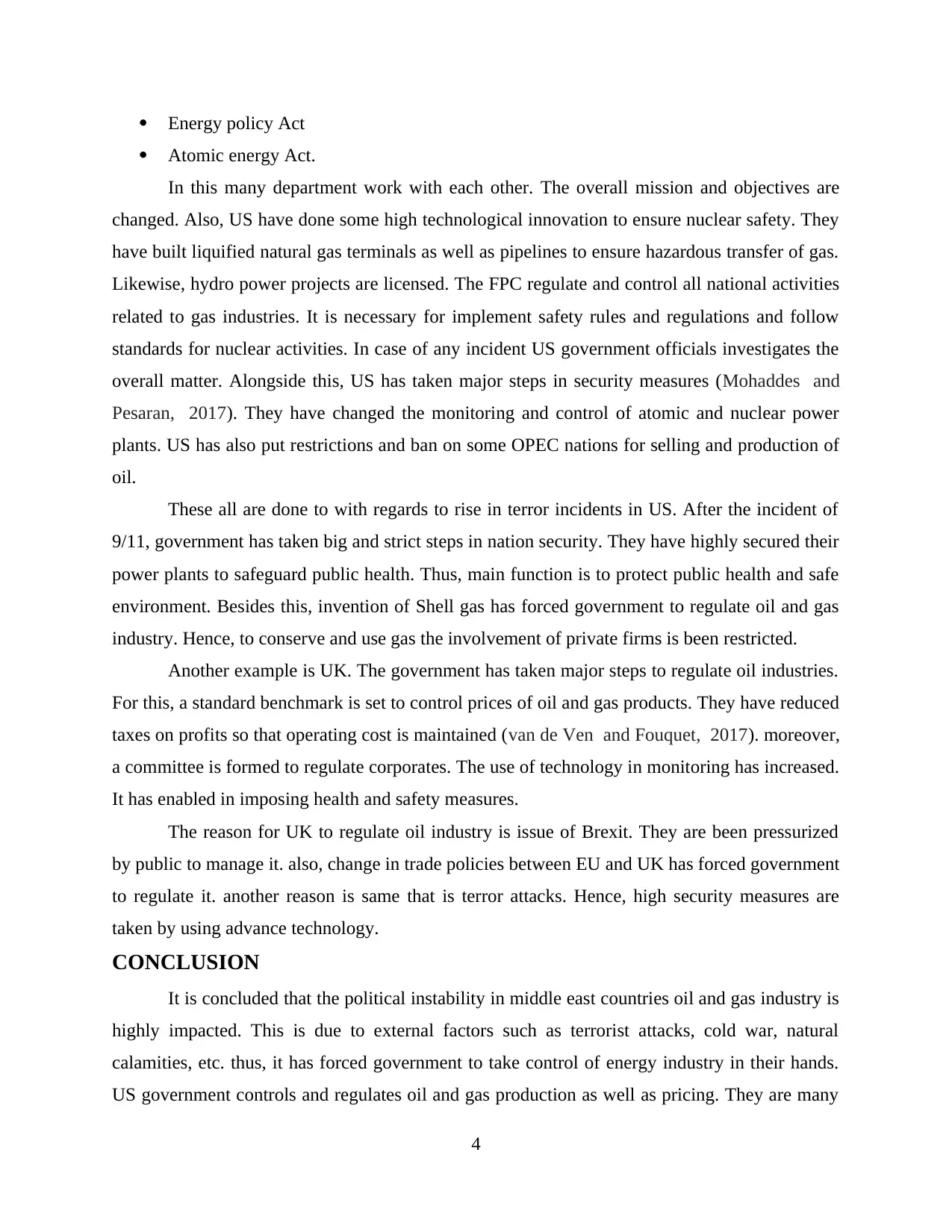
Energy policy Act
Atomic energy Act.
In this many department work with each other. The overall mission and objectives are
changed. Also, US have done some high technological innovation to ensure nuclear safety. They
have built liquified natural gas terminals as well as pipelines to ensure hazardous transfer of gas.
Likewise, hydro power projects are licensed. The FPC regulate and control all national activities
related to gas industries. It is necessary for implement safety rules and regulations and follow
standards for nuclear activities. In case of any incident US government officials investigates the
overall matter. Alongside this, US has taken major steps in security measures (Mohaddes and
Pesaran, 2017). They have changed the monitoring and control of atomic and nuclear power
plants. US has also put restrictions and ban on some OPEC nations for selling and production of
oil.
These all are done to with regards to rise in terror incidents in US. After the incident of
9/11, government has taken big and strict steps in nation security. They have highly secured their
power plants to safeguard public health. Thus, main function is to protect public health and safe
environment. Besides this, invention of Shell gas has forced government to regulate oil and gas
industry. Hence, to conserve and use gas the involvement of private firms is been restricted.
Another example is UK. The government has taken major steps to regulate oil industries.
For this, a standard benchmark is set to control prices of oil and gas products. They have reduced
taxes on profits so that operating cost is maintained (van de Ven and Fouquet, 2017). moreover,
a committee is formed to regulate corporates. The use of technology in monitoring has increased.
It has enabled in imposing health and safety measures.
The reason for UK to regulate oil industry is issue of Brexit. They are been pressurized
by public to manage it. also, change in trade policies between EU and UK has forced government
to regulate it. another reason is same that is terror attacks. Hence, high security measures are
taken by using advance technology.
CONCLUSION
It is concluded that the political instability in middle east countries oil and gas industry is
highly impacted. This is due to external factors such as terrorist attacks, cold war, natural
calamities, etc. thus, it has forced government to take control of energy industry in their hands.
US government controls and regulates oil and gas production as well as pricing. They are many
4
Atomic energy Act.
In this many department work with each other. The overall mission and objectives are
changed. Also, US have done some high technological innovation to ensure nuclear safety. They
have built liquified natural gas terminals as well as pipelines to ensure hazardous transfer of gas.
Likewise, hydro power projects are licensed. The FPC regulate and control all national activities
related to gas industries. It is necessary for implement safety rules and regulations and follow
standards for nuclear activities. In case of any incident US government officials investigates the
overall matter. Alongside this, US has taken major steps in security measures (Mohaddes and
Pesaran, 2017). They have changed the monitoring and control of atomic and nuclear power
plants. US has also put restrictions and ban on some OPEC nations for selling and production of
oil.
These all are done to with regards to rise in terror incidents in US. After the incident of
9/11, government has taken big and strict steps in nation security. They have highly secured their
power plants to safeguard public health. Thus, main function is to protect public health and safe
environment. Besides this, invention of Shell gas has forced government to regulate oil and gas
industry. Hence, to conserve and use gas the involvement of private firms is been restricted.
Another example is UK. The government has taken major steps to regulate oil industries.
For this, a standard benchmark is set to control prices of oil and gas products. They have reduced
taxes on profits so that operating cost is maintained (van de Ven and Fouquet, 2017). moreover,
a committee is formed to regulate corporates. The use of technology in monitoring has increased.
It has enabled in imposing health and safety measures.
The reason for UK to regulate oil industry is issue of Brexit. They are been pressurized
by public to manage it. also, change in trade policies between EU and UK has forced government
to regulate it. another reason is same that is terror attacks. Hence, high security measures are
taken by using advance technology.
CONCLUSION
It is concluded that the political instability in middle east countries oil and gas industry is
highly impacted. This is due to external factors such as terrorist attacks, cold war, natural
calamities, etc. thus, it has forced government to take control of energy industry in their hands.
US government controls and regulates oil and gas production as well as pricing. They are many
4
⊘ This is a preview!⊘
Do you want full access?
Subscribe today to unlock all pages.

Trusted by 1+ million students worldwide
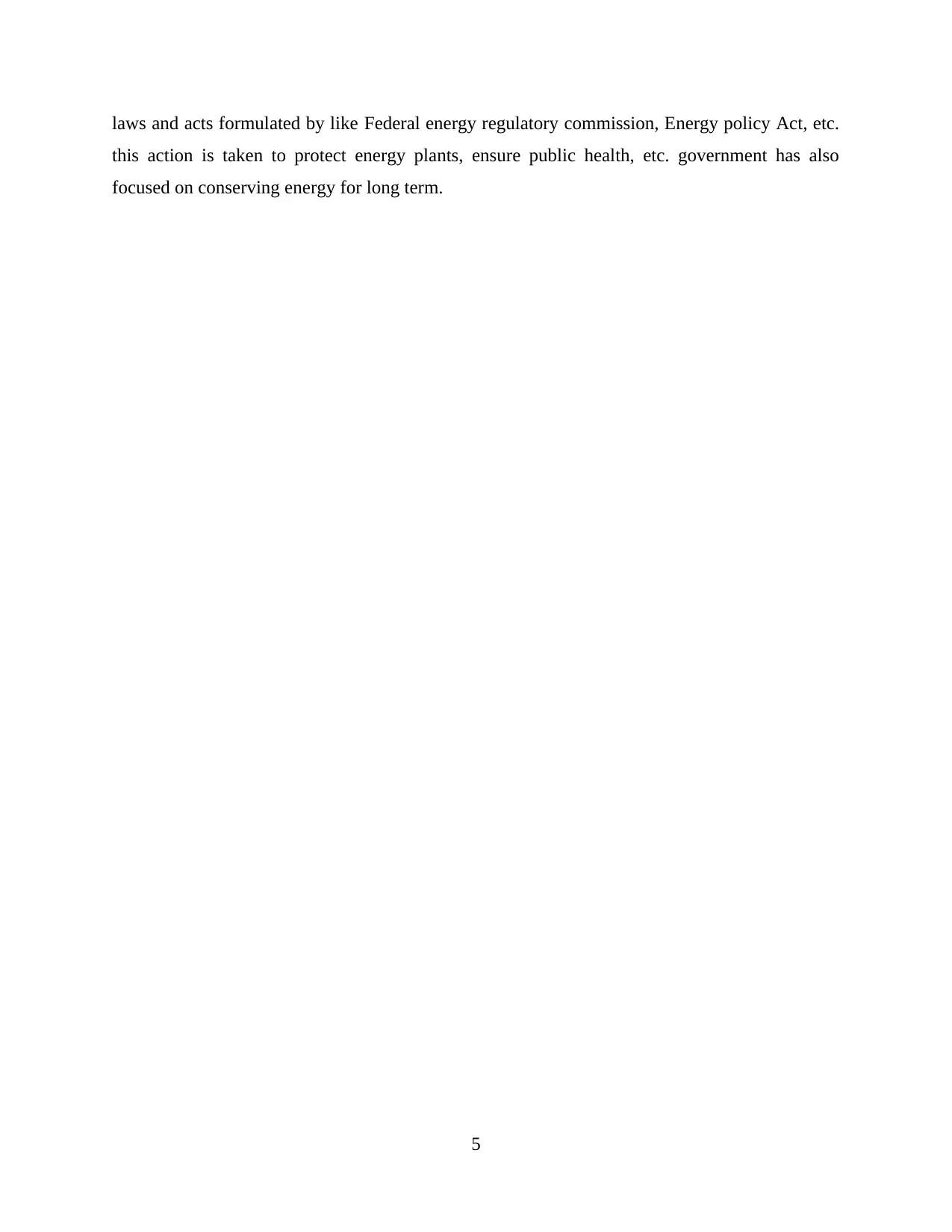
laws and acts formulated by like Federal energy regulatory commission, Energy policy Act, etc.
this action is taken to protect energy plants, ensure public health, etc. government has also
focused on conserving energy for long term.
5
this action is taken to protect energy plants, ensure public health, etc. government has also
focused on conserving energy for long term.
5
Paraphrase This Document
Need a fresh take? Get an instant paraphrase of this document with our AI Paraphraser
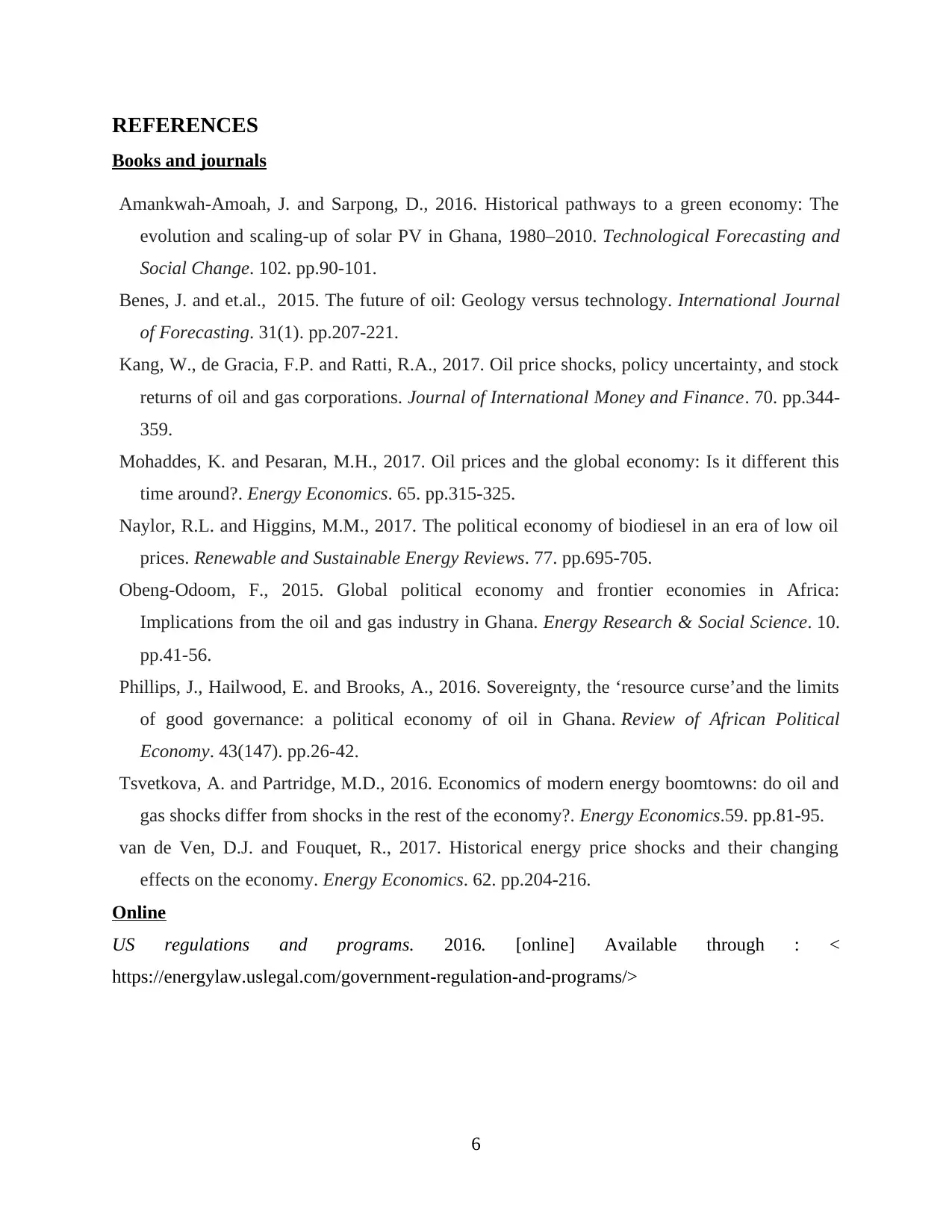
REFERENCES
Books and journals
Amankwah-Amoah, J. and Sarpong, D., 2016. Historical pathways to a green economy: The
evolution and scaling-up of solar PV in Ghana, 1980–2010. Technological Forecasting and
Social Change. 102. pp.90-101.
Benes, J. and et.al., 2015. The future of oil: Geology versus technology. International Journal
of Forecasting. 31(1). pp.207-221.
Kang, W., de Gracia, F.P. and Ratti, R.A., 2017. Oil price shocks, policy uncertainty, and stock
returns of oil and gas corporations. Journal of International Money and Finance. 70. pp.344-
359.
Mohaddes, K. and Pesaran, M.H., 2017. Oil prices and the global economy: Is it different this
time around?. Energy Economics. 65. pp.315-325.
Naylor, R.L. and Higgins, M.M., 2017. The political economy of biodiesel in an era of low oil
prices. Renewable and Sustainable Energy Reviews. 77. pp.695-705.
Obeng-Odoom, F., 2015. Global political economy and frontier economies in Africa:
Implications from the oil and gas industry in Ghana. Energy Research & Social Science. 10.
pp.41-56.
Phillips, J., Hailwood, E. and Brooks, A., 2016. Sovereignty, the ‘resource curse’and the limits
of good governance: a political economy of oil in Ghana. Review of African Political
Economy. 43(147). pp.26-42.
Tsvetkova, A. and Partridge, M.D., 2016. Economics of modern energy boomtowns: do oil and
gas shocks differ from shocks in the rest of the economy?. Energy Economics.59. pp.81-95.
van de Ven, D.J. and Fouquet, R., 2017. Historical energy price shocks and their changing
effects on the economy. Energy Economics. 62. pp.204-216.
Online
US regulations and programs. 2016. [online] Available through : <
https://energylaw.uslegal.com/government-regulation-and-programs/>
6
Books and journals
Amankwah-Amoah, J. and Sarpong, D., 2016. Historical pathways to a green economy: The
evolution and scaling-up of solar PV in Ghana, 1980–2010. Technological Forecasting and
Social Change. 102. pp.90-101.
Benes, J. and et.al., 2015. The future of oil: Geology versus technology. International Journal
of Forecasting. 31(1). pp.207-221.
Kang, W., de Gracia, F.P. and Ratti, R.A., 2017. Oil price shocks, policy uncertainty, and stock
returns of oil and gas corporations. Journal of International Money and Finance. 70. pp.344-
359.
Mohaddes, K. and Pesaran, M.H., 2017. Oil prices and the global economy: Is it different this
time around?. Energy Economics. 65. pp.315-325.
Naylor, R.L. and Higgins, M.M., 2017. The political economy of biodiesel in an era of low oil
prices. Renewable and Sustainable Energy Reviews. 77. pp.695-705.
Obeng-Odoom, F., 2015. Global political economy and frontier economies in Africa:
Implications from the oil and gas industry in Ghana. Energy Research & Social Science. 10.
pp.41-56.
Phillips, J., Hailwood, E. and Brooks, A., 2016. Sovereignty, the ‘resource curse’and the limits
of good governance: a political economy of oil in Ghana. Review of African Political
Economy. 43(147). pp.26-42.
Tsvetkova, A. and Partridge, M.D., 2016. Economics of modern energy boomtowns: do oil and
gas shocks differ from shocks in the rest of the economy?. Energy Economics.59. pp.81-95.
van de Ven, D.J. and Fouquet, R., 2017. Historical energy price shocks and their changing
effects on the economy. Energy Economics. 62. pp.204-216.
Online
US regulations and programs. 2016. [online] Available through : <
https://energylaw.uslegal.com/government-regulation-and-programs/>
6

7
⊘ This is a preview!⊘
Do you want full access?
Subscribe today to unlock all pages.

Trusted by 1+ million students worldwide
1 out of 9
Related Documents
Your All-in-One AI-Powered Toolkit for Academic Success.
+13062052269
info@desklib.com
Available 24*7 on WhatsApp / Email
![[object Object]](/_next/static/media/star-bottom.7253800d.svg)
Unlock your academic potential
Copyright © 2020–2025 A2Z Services. All Rights Reserved. Developed and managed by ZUCOL.




